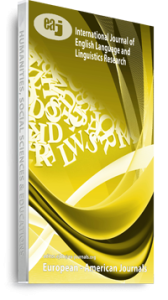Metonymy is not only a trope but also a basic way of thinking, and a conceptual tool in which one conceptual entity, the vehicle, offers mental access to another conceptual identity, the target. Panther & Thornburg (1999) hold that, in accordance with the pragmatic functions, metonymies can be classified into propositional metonymies and illocutionary metonymies. In accordance with speech act theory, illocutionary force of an utterance suggests the speaker’s intention in delivering the utterance. Although illocutionary metonymy prevails in literary texts, very few papers have contributed to the research of illocutionary metonymies in this area. This paper will focus on figuring out illocutionary metonymies in Li Bai’s poetry, the motivations and significance of illocutionary metonymies to offer a new perspective on applying cognitive linguistic theories to the exploration of literary texts.
Keywords: Cognitive Pragmatic Analysis, Illocutionary Metonymies, Li Bai’s Poems

